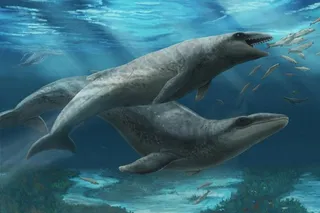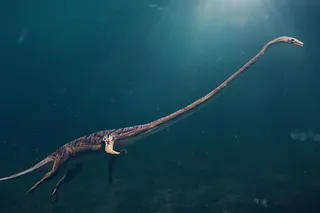As the largest-ever marine predator, the megalodon shark made infamous by Hollywood, measured up to 50 feet in length and was surprisingly warm-blooded, according to a new study published in Proceedings of the National Academy of Sciences.
This keen adaptation allowed the “meg” to venture into cold waters and extend its range, but paradoxically, it also bled off crucial energy, which may have contributed to the species’ extinction.
Read More: The Mystery of the Megalodon and What Scientists Know
The shark left behind long teeth that now make up the bulk of its fossil record, and the researchers analyzed those to determine how the animals responded to cold waters and frigid times.
They narrowed in on a tooth mineral called apatite, which contains isotopes of carbon and oxygen that reflect the temperature the shark’s body had maintained under harsh conditions. The megalodon would have seen plenty as it went extinct ...














